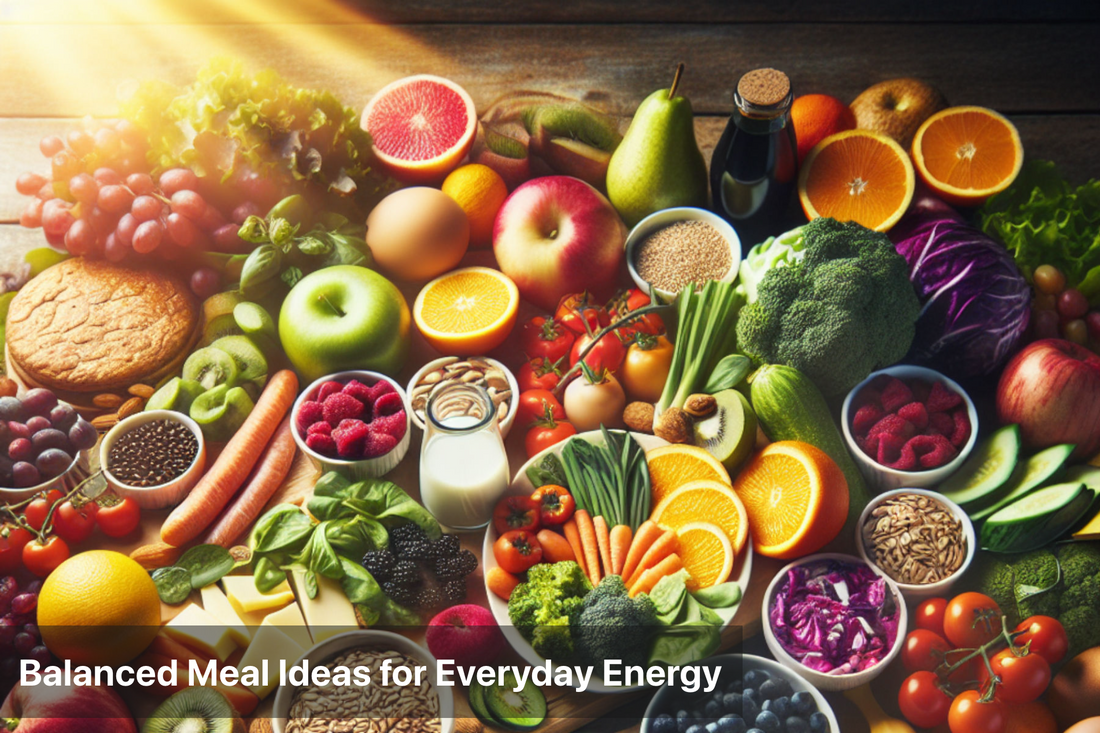
Balanced Meal Ideas for Everyday Energy
Share
We’ve all experienced it—the afternoon slump, the sluggish mornings, the foggy evenings. But what if the secret to feeling energized all day long lies not in another cup of coffee, but in the way we eat? A balanced meal, built with intention and variety, fuels your body and brain for steady energy from sunrise to bedtime.
Whether you're working, parenting, or managing a hectic schedule, here’s a complete guide to everyday meal ideas that keep your energy consistent without spikes or crashes.
Why Balanced Meals Matter for Energy
Food is fuel, but not all calories are created equal. Meals overloaded with refined carbs or lacking in protein and fiber can cause energy dips, poor focus, and hunger soon after eating.
A truly balanced meal includes:
Complex carbohydrates for sustained energy
Protein to keep you full and support muscle repair
Healthy fats to stabilize blood sugar and support brain health
Fiber for digestion and blood sugar control
Vitamins & minerals to support cellular function
This nutrient synergy supports consistent energy levels, better concentration, improved metabolism, and fewer cravings throughout the day.
Energizing Breakfasts to Start Strong
Your first meal sets the tone for the day. Avoid sugary cereals or refined bread—opt for slow-digesting foods that keep you powered till lunch.
Smart Breakfast Options:
Oats with almonds, banana, and flaxseeds
Masala omelette + whole grain toast + fruit
Smoothie with Greek yogurt, spinach, berries, and chia
Paneer or tofu scramble with millet roti
Tip: Always combine protein + carbs + fats for a complete start.
Midday Meals That Refuel Without Weighing You Down
Lunch should replenish your energy reserves without triggering a post-lunch slump. Keep portions moderate, with enough fiber and lean protein.
Balanced Lunch Ideas:
Grilled chicken or tofu quinoa bowl with veggies and seeds
Rajma-chawal + salad + roasted papad
Paneer tikka + multigrain roti + sautéed spinach
Buddha bowl with chickpeas, sweet potato, greens, and tahini
Include something raw (salad or fruit) to improve digestion and satiety.
Smart Dinners That Help You Recharge
Dinner should be lighter than lunch but still complete—helping your body repair and reset overnight without overloading your digestion.
Examples:
Lentil soup + sautéed veggies + toast
Grilled fish with steamed broccoli and mashed sweet potato
Stir-fried tofu with bell peppers + brown rice
Khichdi with moong dal, ghee, and curd
Add warming spices like turmeric, cumin, and ginger for enhanced digestion and flavor.
Sample Balanced Meals for the Day
Meal |
Menu Idea |
Energy (kcal) |
Protein |
Fiber |
Fats |
|---|---|---|---|---|---|
Breakfast |
Masala oats + boiled egg + apple |
350 kcal |
15g |
8g |
10g |
Lunch |
Grilled tofu bowl (quinoa, spinach, carrot, hummus) |
500 kcal |
24g |
12g |
18g |
Dinner |
Moong dal soup + roti + cucumber salad |
420 kcal |
20g |
9g |
14g |
Snack |
Fruit + handful of mixed nuts |
200 kcal |
6g |
4g |
15g |
Energizing Snacks for Between Meals
Smart snacking prevents energy dips and supports better portion control at meals. Choose snacks that combine protein and fiber.
Good Options:
Boiled eggs with masala
Nut butter on whole grain crackers
Greek yogurt with berries
Roasted chickpeas or makhana
Cottage cheese + fruit
Trail mix with almonds, pumpkin seeds, and raisins
Avoid: High-sugar bars, fruit juices, or fried snacks that lead to energy crashes.
Hydration Also Affects Energy
Often, fatigue isn’t due to poor food—it’s dehydration in disguise.
Tips to stay hydrated:
Drink 6–8 glasses of water daily
Start your day with warm water + lemon
Include hydrating foods (cucumber, watermelon, soups)
Avoid excessive caffeine or sugary drinks
Adding electrolytes (via coconut water or lemon-salt water) helps when you’re active or working long hours.
Meal Planning Tips for Sustained Energy
Prep in advance: Cook grains, chop veggies, or grill protein ahead of time
Don’t skip meals: Skipping meals leads to low energy and binge eating later
Balance every plate: Use the macro template: protein + carbs + fat + fiber
Portion control: Eat enough to feel full, not stuffed
Add color: More colors = more nutrients = more energy
Sample Balanced Meal Plan for a Workday
Time |
Meal |
Key Nutrients Focused |
|---|---|---|
8:00 AM |
Greek yogurt + granola + banana |
Protein + complex carbs |
11:00 AM |
Boiled eggs + black coffee |
Protein + healthy fat |
1:30 PM |
Tofu stir-fry + brown rice + carrot cucumber salad |
Protein + fiber |
4:30 PM |
Chia pudding with berries |
Healthy fat + fiber |
7:30 PM |
Lentil soup + whole grain roti + sautéed spinach |
Fiber + iron + protein |
Summary
Balanced meals are your best bet for sustaining energy, enhancing focus, and feeling good every day. By including the right mix of protein, healthy fats, complex carbs, and fiber in every meal, you give your body long-lasting fuel—not just quick bursts. Whether it’s a quinoa bowl, a chickpea curry, or a smoothie with nut butter, the secret is variety, portion control, and mindful combinations. Prioritize balance, and you’ll start to feel the difference—in your energy, focus, and overall well-being.






